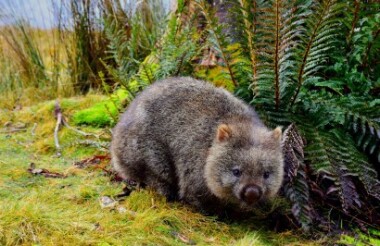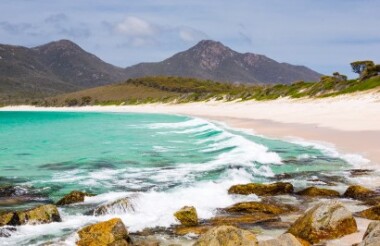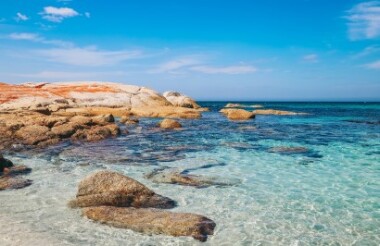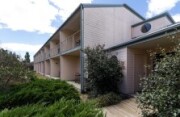Hidden Tasmania Gems Tour
Tasmania is Australia's best-kept secret. Its ancient national parks are home to the country's tallest trees as well as creatures found nowhere else in the world. This 6 day itinerary will give you a glimpse of this incredible island state. Starting in Hobart, you will have a chance to experience some of the city's culture, before heading north to Cradle Mountain National Park, Launceston, the Bay of Fires, and Wineglass Bay - regarded as one of the most beautiful beaches in the world.
With plenty of opportunities to customise, this road trip will surely be one to remember.
See what's included
- Meals included: 4 breakfasts

Self Drive Tour
This suggested tour costs from AUD$2,300 per person (twin share, low season)
Starts in Hobart, finishes in Hobart
6 days/5 nights
Hotel 3 star
Rental car included
Viewed 238 times in the last 7 days
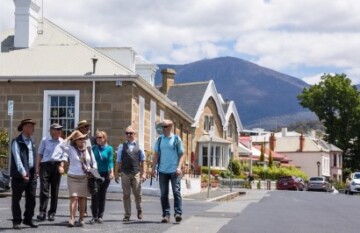
Welcome to Hobart, the capital city of Tasmania and the perfect base for exploring many of Tasmania's highlights. The second-oldest capital city in Australia, Hobart is rich in history yet surrounded by beaches, bushland and mountains. Explore the galleries, theatres and restaurants along Salamanca Place and the unmissable Salamanca Market on Saturdays, or take a ferry up the river to visit the MONA for an out-of-this-world modern art experience.
Our rental car range includes the latest vehicles from the top suppliers. From economy hatchbacks to SUVs, we can help you decide on a car suitable for this leg of your trip. Insurance can often be included with a small excess or deductible.
Head to the Hobart City depot today to collect your chosen rental car, and continue your journey.
Hobart is Australia's second-oldest state capital, founded in 1804. This city is teeming with inspired art and thriving markets has an exciting and dynamic food scene, and is surrounded by natural beauty. Head to MONA (Museum of Old and New Art) to get your art fix or if you're there on a weekend, head to Salamanca to immerse yourself in the markets, home to more than 300 stalls selling arts, crafts, homewares and produce. The beautiful sandstone warehouses that were once frequented by sailors, whalers, and workmen have morphed into one of the city's most vibrant cultural scenes.
If you fancy a taste of some local beverages, consider heading to one of the local distilleries or breweries. For some of the best views of the city, take a 30 minute drive out to Mount Wellington, which is even more amazing at sunset. With a coffee caravan and Australia's oldest brewery along the way up, it is the perfect activity no matter what the time of day! For those looking for a bit more activity, there are some fantastic walking tracks located below the summit at The Springs.
Discover Hobart by foot and hear the fascinating stories of how Tasmania’s capital city was established and how it grew to become the vibrant waterfront city it is today. A local Tasmanian guide will identify the heritage-listed buildings of Hobart while walking the old town. Hear the stories of the hardened characters and issues that were major influences in the early days of Hobart.
Mona, the Museum of Old and New Art, is Australia's largest privately-owned gallery and museum. Showcasing the diverse collection of its owner, Tasmanian gambler and maths nerd David Walsh, Mona exhibits everything from ancient Egyptian funerary objects and modernist masterpieces to a word waterfall and a machine that mimics the human digestive system. The Mona site - perched on the banks of the River Derwent, not far from Hobart - is also home to the Moorilla Winery, The Source restaurant, a bunch of other bars and restaurants, luxury accommodation pavilions, and Tasmania’s biggest craft brewery (Moo Brew).
Your accommodation: Hotel Grand Chancellor Hobart
Conveniently located amongst all the action, this family-friendly hotel allows you to sit back and enjoy both harbour and mountain views from one of the best places to stay in Hobart. The Hotel Grand Chancellor Hobart is also just a short walk away from popular attractions such as Salamanca Place and The Markets, Battery Point, the MONA Ferry and the CBD.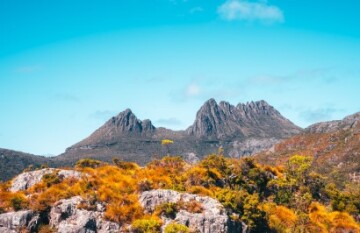
Depart Hobart, passing the Avante-Garde Museum of Old and New Art (MONA) before crossing the Derwent River. The Midland Highway will take you through quaint towns such as Kempton, home to the Old Kempton Distillery where you can try local gin or whiskey, or just grab a snack at the cafe. Further along is Oatlands, one of Tasmania's oldest settlements and home to more than 150 sandstone buildings, the largest collection of any Australian town.
Continue through Turnbridge, Campbell Town and Longford before heading west towards the Walls of Jerusalem National Park. In the centre of Sheffield, you'll find Mural Park. The park hosts an annual Mural Fest Painting Competition. Now with over 140 murals, this rural town is its own outdoor gallery worth a stop to stretch your legs.
It is now just an hour to your destination, Cradle Mountain township. Located at the northern end of the Cradle Mountain-Lake St Clair National Park, it is one of Tasmania's most visited natural attractions. The park also provides a rich habitat for wildlife, including Tasmanian devils, quolls, platypus, echidna and several bird species.
Cradle Mountain attracts visitors with its breathtaking natural beauty. This diverse landscape has snowy capped mountains, towering cliff faces and deep river gorges, making it the ideal destination to spend relaxing in nature. The Overland Track is a 65 kilometre bushwalk which begins in Cradle Mountain, extending to Lake St. Clair. Hikers will encounter glacial valleys, rainforests, moorlands, meadows and lots of native wildlife throughout the experience, making it one of the popular walks in Australia. For those with limited time in the area, catch the Cradle Mountain shuttle bus from the Visitor Centre car park and walk the short 6 kilometre circuit around Dove Lake.
A world-class wildlife conservation facility at Tasmania’s premier wilderness destination. The spectacular and pristine wilderness of Cradle Mountain is home to the mysterious and secretive Tasmanian Devil and the sanctuary comes alive in the evening! The After Dark Feeding Tour provides an unforgettable experience, seeing these extraordinary animals in ‘action’ each evening. An experienced keeper will discuss biology, behaviour, threats and the important conservation work being undertaken for these species within the sanctuary.
Devils are primarily a nocturnal species therefore far more active at night, they use environmentally sensitive lighting and focus on the social interactions and feeding habits of these unique carnivores, allowing visitors a rare up-close opportunity of seeing Tasmanian devils in a group feeding situation – quite a spectacular sight!
Your accommodation: Cradle Mountain Hotel
Nestled within breathtaking alpine forest in the central highlands of Tasmania, Cradle Mountain Hotel offers you an inviting home away from home to unwind after a day of exploring our pristine Tasmanian wilderness. Tasmania’s picturesque World Heritage Area at Cradle Mountain will have you ready and raring to explore Cradle Mountain Lake St Clair National Park and the iconic Boat House at Dove Lake; all just a stone’s throw from the Hotel. Get active in the clean mountain air and meet the friendly, furry locals – say hello to the echidnas, wombats and wallabies that roam the hotel surrounds.Driving distance and time (approximate) for this leg: 315 kms / 195 miles : 3.7 hours
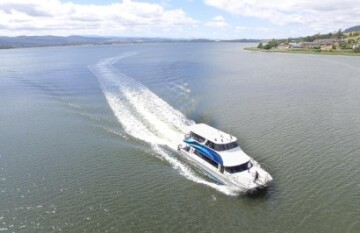
Heading east along Cradle Mountain Road, you will journey along the Dove River Forest Reserve. Turning onto Claude Road, you will pass the small town of Gowrie Park before reaching Sheffield, known as the "Town of Murals". Originally an important rural centre that serviced construction of many nearby hydroelectric dams, the culmination of these projects was feared to bring an economic downturn to the region. Inspired by the stories of other towns who reinvented themselves as tourist destinations, Sheffield’s leadership encouraged, commissioned and created murals on the side of every building and the face of every structure in town. As a result, it remains a popular tourist destination and is the perfect spot to stop for lunch en route to Launceston.
From here, you continue your journey east, crossing the Mersey River and passing by towns such as Deloraine and Westbury before reaching Launceston.
One of Australia's oldest cities, Launceston is one of the best-preserved examples of elegant Colonial and Victorian architecture in Australia, coupled with its century-old parks strung along the banks of the River Tamar. As Tasmania's second largest city, it is also a vibrant hub for food and wine, and one of only two cities in Australia to be named as a UNESCO City of Gastronomy. The Queen Victoria Museum and Art Gallery offers a remarkably diverse and constantly evolving collection of art and museum exhibits, while you can get your nature fix just 15 minutes walk out of the city at the 65 million year old Cataract Gorge. It offers beautiful gardens, 5 kilometers of forested river reserve and walking trails, a swimming pool and a delightfully slow retro chairlift ride that offers far-reaching views over the dramatic gorge.
Cruise past historical Kings Wharf, Seaport and Launceston’s delightful riverfront precinct. The highlight of the experience is cruising into Launceston’s spectacular Cataract Gorge, as the skipper engages the Lady Launceston’s unique silent electric drive. View the sheer cliffs from your comfortable seat, appreciate the unobstructed views on the multi award winning 1890s style vessel and enjoy the skippers captivating commentary on the history of this fascinating area.
Your accommodation: The Sebel Launceston
The Sebel Launceston combines elegant charm with style and convenience. It offers self-contained spacious bedrooms and offers ideal accommodation for leisure travellers. It is located in Lauceston's historic areas, right on the doorsteps of the town's popular attraction.Driving distance and time (approximate) for this leg: 136 kms / 85 miles : 1.7 hours
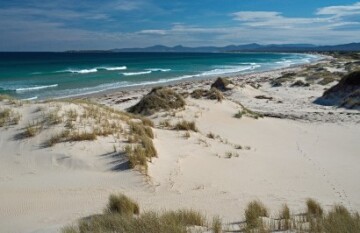
This journey to St Helens is slightly longer than the Tasman Highway, but provides a lot more opportunities for interesting scenery and stops along the way. Your first stop should be Lilydale Falls, about 30 minutes into the journey. This is an easy walk that is accessible to people of all ages and fitness levels.
Another hour or so along the road you will come to Branxholm, where you can do the short Henry Ah Ping Sculpture Walk, which celebrates North East Tasmania’s Chinese heritage. You can read a brief history of Henry Ah Ping and the Chinese miners of Branxholm at the Settler’s Hut, before taking an easy 20 minute circuit walk along the Ormuz/Arba water race and the Jubilee tailrace into the Ah Ping Alluvial Mine.
Continue through to Derby, a town that is known for its historic tin mining and nowadays for mountain biking. If you would like to learn more about its history of tin mining, head to the Tin Mine Centre.
Follow the Tasman Highway and if you'd like something a little unique, take a short detour to Pyengana to the Pub in the Paddock, licensed since 1880 and one of the oldest pubs in Tasmania. The town is also home to Pyengana Dairy, famous for its artisan cheeses. From here, it's just another 30 minutes to St Helens.
The Bay of Fires is famous for its extraordinary blue seas, white sand beaches, and brilliant orange lichen that grows on the granite boulders lining the bay.
The Bay's gorgeous coastline stretches over 50 kilometres from Binalong Bay in the south to Eddystone Point in the north. The northern section of the bay is part of Mount William National Park; the southern end is a conservation area. The conservation area is divided into three sections, with Ansons Bay dividing the southern and northern ends.
Drawing in visitors for decades, this popular conservation reserve is actually a string of breathtakingly beautiful beaches, interspersed by lagoons and rocky bluffs. Explore the vast white-sand beaches and turquoise seas between Anson’s Bay and Eddystone Point or discover the many beaches like the Gardens, Jeanneret, Swimcart, and Cosy Corner. These magnificent secluded beaches and inlets are a sight to behold and give the Bay of Fires its reputation as one of the most pristine natural wonders of the world.
Your accommodation: Panorama St Helens
On the East Coast of Tasmania, there’s a secret that most holiday trippers won’t discover. Nestled in Tasmania’s oyster capital, the township of St.Helens, is one of the most beautiful views across Georges Bay, with panoramic views over the surrounding seaside. Soak in all that Tasmania has to offer with a stay at Panorama Hotel.Driving distance and time (approximate) for this leg: 168 kms / 104 miles : 2.4 hours
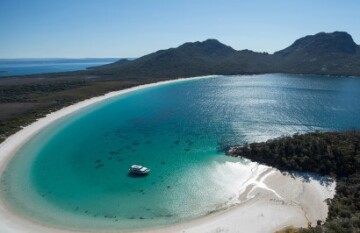
Head south from St Helens and follow the A3 highway along the east coast. Pass the Chain of Lagoons, a popular beach and camping destination for locals and you head towards Bicheno. This family-friendly town is home to the Bicheno Blowhole as well as some of the region's most treasured wildlife at East Coast Natureworld. These include Tasmanian devils, quolls, koalas, snakes, and parrots.
From here it's just 40 minutes more to Coles Bay, the entrance to Freycinet National Park. Here, towering pink-hued mountains, known as the Hazards, are above you, and at their foot are the calm, blue waters of Wineglass Bay.
The world famous Freycinet National Park is a place of wild beauty, occupying most of the Freycinet Peninsula on Tasmania's east coast. The park showcases pink granite peaks, secluded bays, white sand beaches and an abundance of native flora and fauna. Tasmania's most famous beach, Wineglass Bay, forms a perfect white curve bordering azure waters beneath the Hazards mountains - a natural feature of vivid contrasts. At the north-eastern end of the park you will find Cape Tourville lighthouse, an easy track and boardwalk to which will deliver amazing views over the bays and rock formations with opportunities to spot wildlife including sea eagles, whales and dolphins. The cheerily named Friendly Beaches to the north is a stretch of pristine white sand perfect for long walks and dipping into the crystal waters. Easily accessible from the town of Coles Bay, Freycinet is a must-do for all visiting the east coast of Tasmania whether you come to relax or explore.
The Freycinet Paddle is the perfect way to experience Freycinet National Park in 3 hours. On this relaxed guided tour of the Freycinet coastline, you’ll glide beneath pink granite mountains, past pristine sandy beaches and across waters so clear you feel you can touch the marine life below. You’ll experience Freycinet’s abundant wildlife as you weave along the coastline. Guides will share little known stories of the area and give you the chance to find out some fantastic facts.
Cruise the spectacular coastline of Freycinet National Park from Coles Bay to Wineglass Bay. Be enthralled by the stunning granite coastline, including the dramatic pink peaks of the Hazards range.
Your accommodation: Freycinet Lodge
Time stands still and your cares will wash away from the moment you arrive at Freycinet Lodge. Overlooking the blue waters of Great Oyster Bay and with the rugged Hazards mountain range as your backdrop, the location of Freycinet Lodge's accommodation in Freycinet National Park is second to none. Located inside the Freycinet National Park, just past Coles Bay, you will fall in love with this captivating escape in Tasmania.Driving distance and time (approximate) for this leg: 113 kms / 70 miles : 1.5 hours
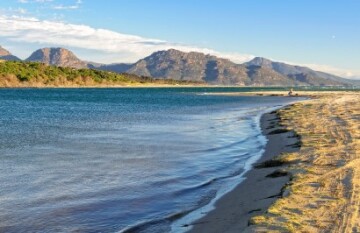
Follow Coles Bay Road back to the Tasman Highway and head south, through the East Coast Wine Region. This is one of Tasmania’s premier wine-growing regions and is known for its fine cool climate varieties. Cellar doors along the coast offer tastings and wine sales, and east coast restaurants showcase these, as well as handcrafted whiskeys, beers and ciders.
Swansea is home to some of the east coast's more spectacular beaches. Originally established as Waterloo Point in 1820, it is one of Tasmania's oldest towns and is steeped in rich history. Pass through Rocky Hills and Little Swanport on your way to Orford. Once a port for a convict station on nearby Maria Island, it is now a very popular holiday spot for locals, it offers plenty of picturesque swimming beaches that are often connected by beautiful walking tracks.
Head inland through Buckland and Orielton and south towards Pitt Water Nature Reserve, this internationally recognised wetland is home to a number of Tasmanian shorebirds and seabirds including sooty oystercatchers, red-capped plover and Caspian terns.
Your journey ends in the state capital, Hobart. With a dynamic food scene, daring art and a wealth of natural attractions, Hobart is a small city with big ideas.
Explore more of Hobart before dropping your rental car at the airport depot and continuing your onward journey.
Your tour comes to an end today, but if you are itching to explore more amazing sights throughout Australia, we can customise your holiday to include more days or additional destinations. Our trusted travel specialists can book transfers to your onward flight, and even assist in booking these flights for you. Our team can't wait to help you design your ultimate getaway!
Driving distance and time (approximate) for this leg: 191 kms / 118 miles : 2.4 hours
